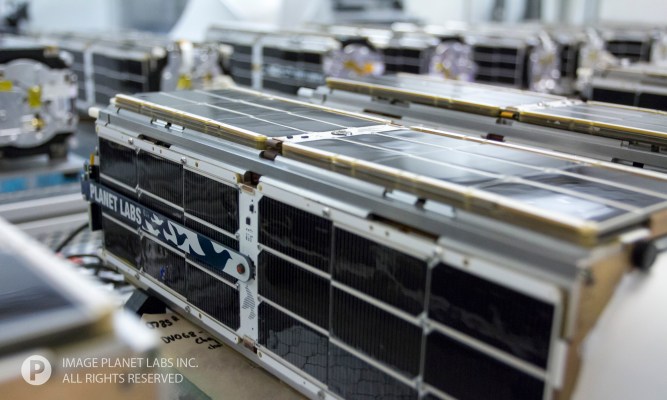In less than five years since being founded, satellite startup Planet Labs has created a whole new way to do satellite imagery. Now that it’s proven out its model of deploying tiny satellites to circle the planet in low orbit, the company has brought on some additional capital and hired veteran tech executive Tom Barton as its COO.
Planet Labs was founded on the idea of taking a new approach to satellite imagery. Satellites in the past were huge, hulking expensive machines that flew well above the Earth and were built to last for decades. In contrast, Planet Labs’ satellites — which it calls “doves” — circle the planet in low orbit and are expected to last just 1-3 years.
As a result, the company believes that it has created a more cost-effective model for photographing the Earth’s surface. It sends dozens of low-cost satellites into space at once, which end up circling the planet and providing imagery that is updated at a much faster cadence than previous satellites could.
Moreover, since new satellites are deployed at a much faster pace than before, the company is able to continually improve the technology that goes into them more frequently. Because it uses the same sorts of components that make their way into mobile phones and other devices, Planet Labs update its doves much more quickly than previous satellite companies could.
Planet Labs launched its first four doves into orbit in 2013, and followed that up by deploying another 67 satellites last year. The company would have had even more satellites circling the Earth, but it lost 26 satellites during the Antares rocket explosion last October.
According to co-founder Will Marshall, that was a difficult day for Planet Labs, but it also showed how the company was able to spread risk across multiple launches instead of relying on a single launch and satellite deployment.
Those doves had included 14 new tech demos that the company had hoped to test out. In the wake of the Antares incident, the company raced to get two more satellites with the same technology into space. They were able to build new doves in just nine days, and those satellites were deployed as part of SpaceX’s January 2015 mission.
To keep growing and get even more satellites into orbit, the company has raised an additional $95 million in a combination of equity and debt financing. The first $70 million of that funding came in a Series C round of equity financing led by Data Collective, with participation from existing investors. Along with the funding, Data Collective managing partner Zack Bogue will be joining its board of directors.
Data Collective is added to a pretty impressive list of investors that includes Yuri Milner, Draper Fisher Jurvetson, Capricorn Investment Group, O’Reilly Alpha Tech Ventures (OATV), Founders Fund, First Round Capital, Innovation Endeavors, AME Cloud Ventures, Industry Ventures, Felicis Ventures, Lux Capital, and Ray Rothrock.
In addition to the equity financing, Planet Labs is taking on a $25 million debt facility from Western Technology Investment. Altogether, Planet Labs has raised $160 million since being founded in 2010.
That’s a ton of money, but Planet Labs is in good position to make it back: The company has clients in a number of different industries, including mapping and agriculture, but sees plenty of room to expand. According to Marshall, the company is generating revenues and its contract value surpasses all the money it has raised to date, including the current round.
Planet Labs has also added a new COO in Tom Barton to help lead the company forward. Barton is the former CEO of Rackable Systems (which is now SGI) and has more than 25 years experience in hardware and software tech companies. He’ll be overseeing operations as Planet Labs seeks to continue its expansion both in deploying new satellites and serving more verticals.
